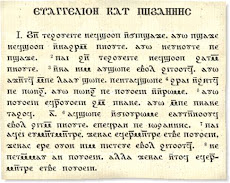Another of the basically irrelevant Trinitarian objections against translating the Sahidic Coptic of John 1:1c as "and the Word was a god" -- which is clearly what it literally says -- is that the Coptic translators could not possibly have "meant" to say that.
The reason given is that the dynamic 4th century Coptic scholar, theologian, bishop and "saint" Athanasius was the staunch adherent of Trinitarianism. And the Coptic Church itself is Trinitarian.
That argument may be of some value in refuting the inaccurate charge that everything Coptic must, by definition, also be Gnostic.
But it has no bearing on positively identifying the theology of the 2nd or 3rd century Sahidic Coptic translators, and no bearing on identifying their possible theological presuppositions while translating John 1:1.
Coptic scholar and translator George W. Horner, in his classic Coptic New Testament English translation, postulates a 2nd century date for the Coptic New Testament. Other scholars, and the Anchor Bible Dictionary give a 3rd century date.
Coptic Church tradition also dates the Coptic New Testament to the 2nd century, "under the supervision of St. Pantaenus [late second century] and St. Clement [160-215]." Therefore, it is quite possible that the Sahidic Coptic translation of the Gospel of John predated Athanasius [300-373] by a couple of generations.
So, what's Athanasius got to do with it?
And as for the Coptic Church, it has not always been a Trinitarian church. Its tradition ascribes its founding the the Gospel writer "Saint" Mark, and there is nothing Trinitarian in Mark's Gospel.
Besides, there was another famous (or infamous, according to one's view) presbyter and theologian in 4th century Alexandria, Egypt. His name was Arius, the noted opponent of Trinitarianism, whose doctrine "was once at least as popular as the doctine that Jesus is God." (Richard Rubenstein, When Jesus Became God, p. 7). Before Nicea (325 CE) many Coptic and other bishops considered Arius' theology to be "orthodox."
So, IF a case could be made for Athanasian Trinitarian influence upon the Sahidic Coptic translators, a similar case could be made for Arian, non-Trinitarian influence.
In point of fact, however, the Sahidic Coptic translators are anonymous. We don't know who they were. Therefore, it is impossible to state dogmatically what their theological presuppositions were, or even if their theological presuppositions influenced their translation of John 1:1.
It is just as likely that they simply made a fair, honest, and accurate translation of John's Greek as they understood it: ne.u.noute pe p.shaje, "And the Word was a god."
Attempts to link Athanasian Trinitarianism to the Sahidic Coptic translators is shown to be just another smokescreen put up by apologists for whom Coptic John 1:1 is extremely unsettling and inconvenient.
Wednesday, November 21, 2007
Subscribe to:
Posts (Atom)
